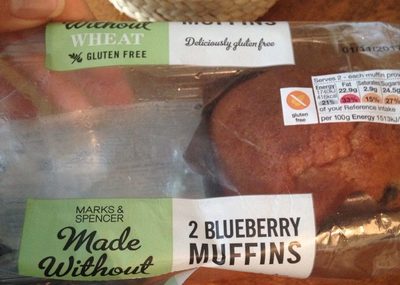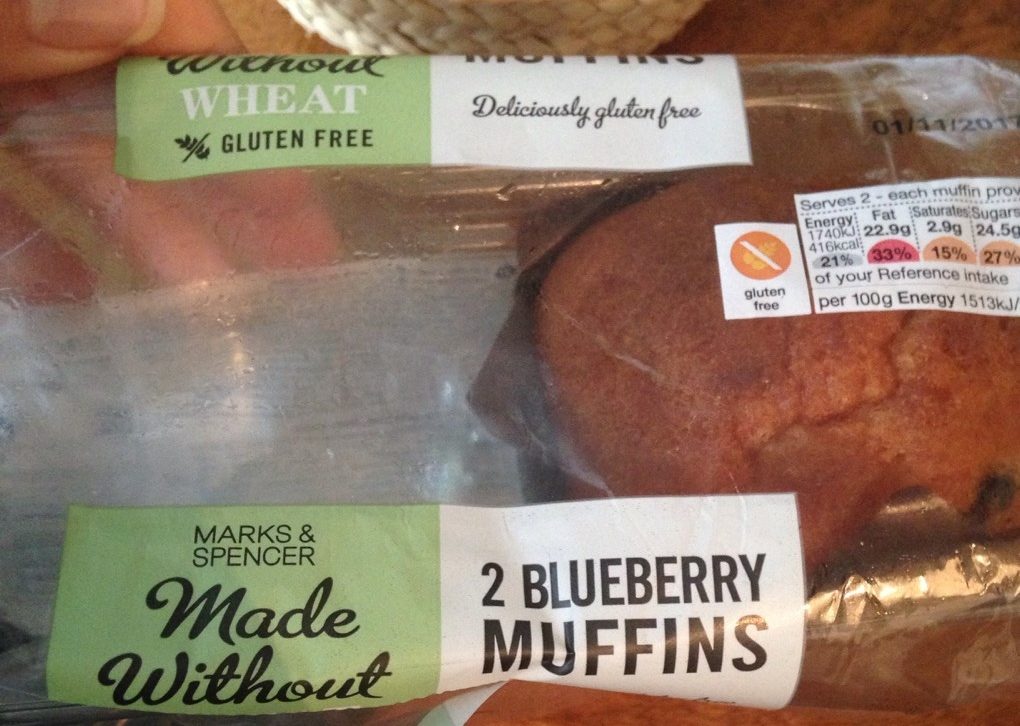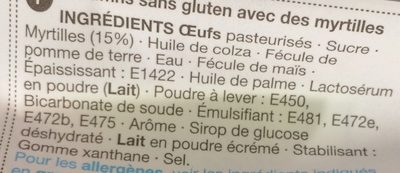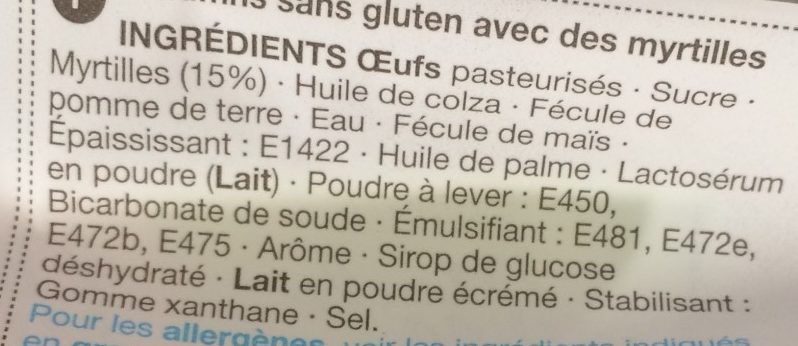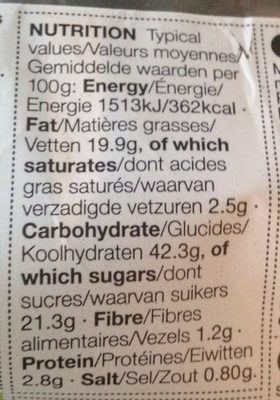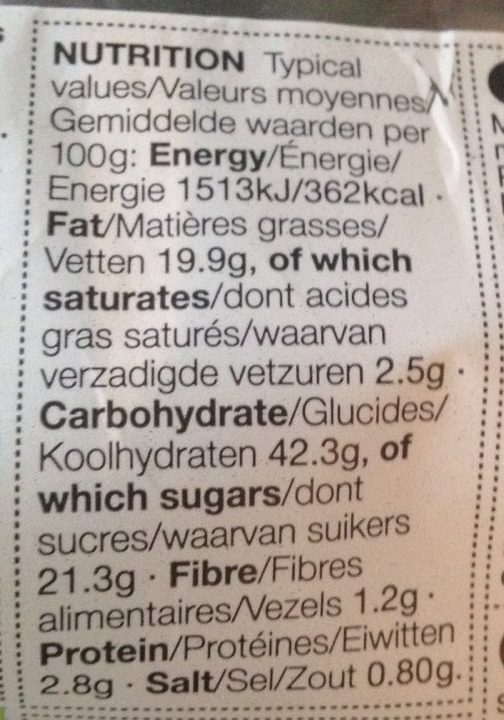Help us make food transparency the norm!
As a non-profit organization, we depend on your donations to continue informing consumers around the world about what they eat.
The food revolution starts with you!
Made Without Wheat Blueberry Muffins - Marks & Spencer - 230 g
Made Without Wheat Blueberry Muffins - Marks & Spencer - 230 g
Ambiguous barcode: This product has a Restricted Circulation Number barcode for products within a company. This means that different producers and stores can use the same barcode for different products.
×
This product page is not complete. You can help to complete it by editing it and adding more data from the photos we have, or by taking more photos using the app for Android or iPhone/iPad. Thank you!
×
Barcode: 00027083
Common name: 2 muffins sans gluten avec des myrtilles. Made Without Wheat Blueberry Muffins
Quantity: 230 g
Packaging: Plastic
Brands: Marks & Spencer
Categories: Snacks, Sweet snacks, Biscuits and cakes, Cakes, Muffins, Fruit muffins, Blueberry muffins
Labels, certifications, awards:
No gluten, Green Dot
Manufacturing or processing places: Royaume-Uni
Stores: Marks & Spencer
Matching with your preferences
Health
Ingredients
-
25 ingredients
: Œufs de poules élevées en plein air pasteurisés - sucre - Myrtilles (15 %) . Huile de colza • Fécule de pomme de terre • Eau - Fécule de maïs • épaississant : E1422 • Huile de palme • Lactosérum en Poudre (Lait) ; Poudre a lever E450, Bicarbonate de soude • Émulsifiant : E481, E472e, E472b, E475 • Arôme - Sirop de déshydraté • Lait en poudre écrémé. : Stabilisant : Gomme xanthane • Sel.Allergens: Eggs, Milk
Food processing
-
Ultra processed foods
Elements that indicate the product is in the 4 - Ultra processed food and drink products group:
- Additive: E1422 - Acetylated distarch adipate
- Additive: E415 - Xanthan gum
- Additive: E450 - Diphosphates
- Additive: E472b - Lactic acid esters of mono- and diglycerides of fatty acids
- Additive: E472e - Mono- and diacetyltartaric acid esters of mono- and diglycerides of fatty acids
- Additive: E475 - Polyglycerol esters of fatty acids
- Additive: E481 - Sodium stearoyl-2-lactylate
- Ingredient: Emulsifier
- Ingredient: Flavouring
- Ingredient: Thickener
- Ingredient: Whey
Food products are classified into 4 groups according to their degree of processing:
- Unprocessed or minimally processed foods
- Processed culinary ingredients
- Processed foods
- Ultra processed foods
The determination of the group is based on the category of the product and on the ingredients it contains.
Additives
-
E1422 - Acetylated distarch adipate
Acetylated distarch adipate: Acetylated distarch adipate -E1422-, is a starch that is treated with acetic anhydride and adipic acid anhydride to resist high temperatures. It is used in foods as a bulking agent, stabilizer and a thickener. No acceptable daily intake for human consumption has been determined.Source: Wikipedia
-
E415 - Xanthan gum
Xanthan gum (E415) is a natural polysaccharide derived from fermented sugars, often used in the food industry as a thickening and stabilizing agent.
This versatile food additive enhances texture and prevents ingredient separation in a wide range of products, including salad dressings, sauces, and gluten-free baked goods.
It is considered safe for consumption even at high intake amounts.
-
E450 - Diphosphates
Diphosphates (E450) are food additives often utilized to modify the texture of products, acting as leavening agents in baking and preventing the coagulation of canned food.
These salts can stabilize whipped cream and are also found in powdered products to maintain their flow properties. They are commonly present in baked goods, processed meats, and soft drinks.
Derived from phosphoric acid, they're part of our daily phosphate intake, which often surpasses recommended levels due to the prevalence of phosphates in processed foods and drinks.
Excessive phosphate consumption is linked to health issues, such as impaired kidney function and weakened bone health. Though diphosphates are generally regarded as safe when consumed within established acceptable daily intakes, it's imperative to monitor overall phosphate consumption to maintain optimal health.
-
E481 - Sodium stearoyl-2-lactylate
Sodium stearoyl lactylate: Sodium stearoyl-2-lactylate -sodium stearoyl lactylate or SSL- is a versatile, FDA approved food additive used to improve the mix tolerance and volume of processed foods. It is one type of a commercially available lactylate. SSL is non-toxic, biodegradable, and typically manufactured using biorenewable feedstocks. Because SSL is a safe and highly effective food additive, it is used in a wide variety of products ranging from baked goods and desserts to pet foods.As described by the Food Chemicals Codex 7th edition, SSL is a cream-colored powder or brittle solid. SSL is currently manufactured by the esterification of stearic acid with lactic acid and partially neutralized with either food-grade soda ash -sodium carbonate- or caustic soda -concentrated sodium hydroxide-. Commercial grade SSL is a mixture of sodium salts of stearoyl lactylic acids and minor proportions of other sodium salts of related acids. The HLB for SSL is 10-12. SSL is slightly hygroscopic, soluble in ethanol and in hot oil or fat, and dispersible in warm water. These properties are the reason that SSL is an excellent emulsifier for fat-in-water emulsions and can also function as a humectant.Source: Wikipedia
-
E500 - Sodium carbonates
Sodium carbonates (E500) are compounds commonly used in food preparation as leavening agents, helping baked goods rise by releasing carbon dioxide when they interact with acids.
Often found in baking soda, they regulate the pH of food, preventing it from becoming too acidic or too alkaline. In the culinary world, sodium carbonates can also enhance the texture and structure of foods, such as noodles, by modifying the gluten network.
Generally recognized as safe, sodium carbonates are non-toxic when consumed in typical amounts found in food.
-
E500ii - Sodium hydrogen carbonate
Sodium hydrogen carbonate, also known as E500ii, is a food additive commonly used as a leavening agent.
When added to recipes, it releases carbon dioxide gas upon exposure to heat or acids, causing dough to rise and resulting in a light, fluffy texture in baked goods.
It is generally recognized as safe (GRAS) by regulatory authorities when used in appropriate quantities and poses no significant health risks when consumed in typical food applications.
Ingredients analysis
-
Palm oil
Ingredients that contain palm oil: Palm oil
-
Non-vegan
Non-vegan ingredients: Free range pasteurised egg, Whey powder, Skimmed milk powder
-
Maybe vegetarian
Ingredients that may not be vegetarian: Whey powder, E481, E472e, E472b, E475, Flavouring
-
Details of the analysis of the ingredients
: _Œufs_ de poules élevées en plein air pasteurisés, sucre, Myrtilles 15%, Huile de colza, Fécule de pomme de terre, Eau, Fécule de maïs, épaississant (e1422, Huile de palme, Lactosérum en Poudre), Poudre a lever (e450), Bicarbonate de soude, Émulsifiant (e481), e472e, e472b, e475, Arôme, Sirop de, _Lait_ en poudre écrémé (Stabilisant), Gomme xanthane, Sel- _Œufs_ de poules élevées en plein air pasteurisés -> en:free-range-pasteurised-egg - vegan: no - vegetarian: yes - ciqual_food_code: 22000 - percent_min: 15 - percent_max: 70
- sucre -> en:sugar - vegan: yes - vegetarian: yes - ciqual_proxy_food_code: 31016 - percent_min: 15 - percent_max: 21.3
- Myrtilles -> en:blueberry - vegan: yes - vegetarian: yes - ciqual_food_code: 13028 - percent_min: 15 - percent: 15 - percent_max: 15
- Huile de colza -> en:colza-oil - vegan: yes - vegetarian: yes - from_palm_oil: no - ciqual_food_code: 17130 - percent_min: 0 - percent_max: 15
- Fécule de pomme de terre -> en:potato-starch - vegan: yes - vegetarian: yes - ciqual_proxy_food_code: 9510 - percent_min: 0 - percent_max: 15
- Eau -> en:water - vegan: yes - vegetarian: yes - ciqual_food_code: 18066 - percent_min: 0 - percent_max: 15
- Fécule de maïs -> en:corn-starch - vegan: yes - vegetarian: yes - ciqual_food_code: 9510 - percent_min: 0 - percent_max: 14
- épaississant -> en:thickener - percent_min: 0 - percent_max: 11.6666666666667
- e1422 -> en:e1422 - vegan: yes - vegetarian: yes - percent_min: 0 - percent_max: 11.6666666666667
- Huile de palme -> en:palm-oil - vegan: yes - vegetarian: yes - from_palm_oil: yes - ciqual_food_code: 16129 - percent_min: 0 - percent_max: 5.83333333333333
- Lactosérum en Poudre -> en:whey-powder - vegan: no - vegetarian: maybe - percent_min: 0 - percent_max: 3.88888888888889
- Poudre a lever -> en:raising-agent - percent_min: 0 - percent_max: 10
- e450 -> en:e450 - vegan: yes - vegetarian: yes - percent_min: 0 - percent_max: 10
- Bicarbonate de soude -> en:e500ii - vegan: yes - vegetarian: yes - percent_min: 0 - percent_max: 8.75
- Émulsifiant -> en:emulsifier - percent_min: 0 - percent_max: 7.77777777777778
- e481 -> en:e481 - vegan: maybe - vegetarian: maybe - from_palm_oil: maybe - percent_min: 0 - percent_max: 7.77777777777778
- e472e -> en:e472e - vegan: maybe - vegetarian: maybe - from_palm_oil: maybe - percent_min: 0 - percent_max: 7
- e472b -> en:e472b - vegan: maybe - vegetarian: maybe - from_palm_oil: maybe - percent_min: 0 - percent_max: 6.36363636363636
- e475 -> en:e475 - vegan: maybe - vegetarian: maybe - percent_min: 0 - percent_max: 5.83333333333333
- Arôme -> en:flavouring - vegan: maybe - vegetarian: maybe - percent_min: 0 - percent_max: 5
- Sirop de -> en:syrup - vegan: yes - vegetarian: yes - percent_min: 0 - percent_max: 5
- _Lait_ en poudre écrémé -> en:skimmed-milk-powder - vegan: no - vegetarian: yes - ciqual_food_code: 19054 - percent_min: 0 - percent_max: 4.66666666666667
- Stabilisant -> en:stabiliser - percent_min: 0 - percent_max: 4.66666666666667
- Gomme xanthane -> en:e415 - vegan: yes - vegetarian: yes - percent_min: 0 - percent_max: 4.375
- Sel -> en:salt - vegan: yes - vegetarian: yes - ciqual_food_code: 11058 - percent_min: 0 - percent_max: 0.8
Nutrition
-
Poor nutritional quality
⚠ ️Warning: the amount of fruits, vegetables and nuts is not specified on the label, it was manually estimated from the list of ingredients: 15This product is not considered a beverage for the calculation of the Nutri-Score.
Positive points: 1
- Proteins: 1 / 5 (value: 2.8, rounded value: 2.8)
- Fiber: 1 / 5 (value: 1.2, rounded value: 1.2)
- Fruits, vegetables, nuts, and colza/walnut/olive oils: 0 / 5 (value: 15, rounded value: 15)
Negative points: 13
- Energy: 4 / 10 (value: 1515, rounded value: 1515)
- Sugars: 4 / 10 (value: 21.3, rounded value: 21.3)
- Saturated fat: 2 / 10 (value: 2.5, rounded value: 2.5)
- Sodium: 3 / 10 (value: 320, rounded value: 320)
The points for proteins are not counted because the negative points are greater or equal to 11.
Nutritional score: (13 - 1)
Nutri-Score:
-
Nutrient levels
-
Fat in moderate quantity (19.9%)
What you need to know- A high consumption of fat, especially saturated fats, can raise cholesterol, which increases the risk of heart diseases.
Recommendation: Limit the consumption of fat and saturated fat- Choose products with lower fat and saturated fat content.
-
Saturated fat in moderate quantity (2.5%)
What you need to know- A high consumption of fat, especially saturated fats, can raise cholesterol, which increases the risk of heart diseases.
Recommendation: Limit the consumption of fat and saturated fat- Choose products with lower fat and saturated fat content.
-
Sugars in high quantity (21.3%)
What you need to know- A high consumption of sugar can cause weight gain and tooth decay. It also augments the risk of type 2 diabetes and cardio-vascular diseases.
Recommendation: Limit the consumption of sugar and sugary drinks- Sugary drinks (such as sodas, fruit beverages, and fruit juices and nectars) should be limited as much as possible (no more than 1 glass a day).
- Choose products with lower sugar content and reduce the consumption of products with added sugars.
-
Salt in moderate quantity (0.8%)
What you need to know- A high consumption of salt (or sodium) can cause raised blood pressure, which can increase the risk of heart disease and stroke.
- Many people who have high blood pressure do not know it, as there are often no symptoms.
- Most people consume too much salt (on average 9 to 12 grams per day), around twice the recommended maximum level of intake.
Recommendation: Limit the consumption of salt and salted food- Reduce the quantity of salt used when cooking, and don't salt again at the table.
- Limit the consumption of salty snacks and choose products with lower salt content.
-
-
Nutrition facts
Nutrition facts As sold
for 100 g / 100 mlAs sold
per serving (115 g)Compared to: Blueberry muffins Energy 1,515 kj
(362 kcal)1,740 kj
(416 kcal)+2% Fat 19.9 g 22.9 g +21% Saturated fat 2.5 g 2.88 g -6% Carbohydrates 42.3 g 48.6 g -12% Sugars 21.3 g 24.5 g -12% Fiber 1.2 g 1.38 g -37% Proteins 2.8 g 3.22 g -45% Salt 0.8 g 0.92 g +11% Fruits‚ vegetables‚ nuts and rapeseed‚ walnut and olive oils (manual estimate from ingredients list) 15 % 15 % Fruits‚ vegetables‚ nuts and rapeseed‚ walnut and olive oils (estimate from ingredients list analysis) 22.5 % 22.5 %
Environment
-
Eco-Score C - Moderate environmental impact
⚠ ️Select a country in order to include the full impact of transportation.The Eco-Score is an experimental score that summarizes the environmental impacts of food products.→ The Eco-Score was initially developped for France and it is being extended to other European countries. The Eco-Score formula is subject to change as it is regularly improved to make it more precise and better suited to each country.Life cycle analysis
-
Average impact of products of the same category: B (Score: 68/100)
Category: Muffin, with blueberry or chocolate
Category: Muffin, with blueberry or chocolate
- PEF environmental score: 0.36 (the lower the score, the lower the impact)
- including impact on climate change: 4.24 kg CO2 eq/kg of product
Stage Impact Agriculture
53.0 %Processing
36.9 %Packaging
5.3 %Transportation
3.5 %Distribution
1.4 %Consumption
0.0 %
Bonuses and maluses
-
Missing origins of ingredients information
Malus: -5
⚠ ️ The origins of the ingredients of this product are not indicated.
If they are indicated on the packaging, you can modify the product sheet and add them.
If you are the manufacturer of this product, you can send us the information with our free platform for producers.
-
Ingredients that threatens species
Malus: -10
Contains palm oil
Tropical forests in Asia, Africa and Latin America are destroyed to create and expand oil palm tree plantations. The deforestation contributes to climate change, and it endangers species such as the orangutan, the pigmy elephant and the Sumatran rhino.
-
Packaging with a medium impact
Malus: -10
Shape Material Recycling Impact Unknown Plastic High ⚠ ️ The information about the packaging of this product is not sufficiently precise (exact shapes and materials of all components of the packaging).⚠ ️ For a more precise calculation of the Eco-Score, you can modify the product page and add them.
If you are the manufacturer of this product, you can send us the information with our free platform for producers.
Eco-Score for this product
-
Impact for this product: C (Score: 43/100)
Product: Made Without Wheat Blueberry Muffins - Marks & Spencer - 230 g
Life cycle analysis score: 68
Sum of bonuses and maluses: -25
Final score: 43/100
-
Carbon footprint
-
Equal to driving 2.2 km in a petrol car
424 g CO² per 100g of product
The carbon emission figure comes from ADEME's Agribalyse database, for the category: Muffin, with blueberry or chocolate (Source: ADEME Agribalyse Database)
Stage Impact Agriculture
37.4 %Processing
51.9 %Packaging
6.8 %Transportation
3.4 %Distribution
0.5 %Consumption
0.0 %
Packaging
-
Packaging with a medium impact
-
Packaging parts
(Plastic)
-
Packaging materials
Material % Packaging weight Packaging weight per 100 g of product Plastic
-
Transportation
-
Origins of ingredients
Missing origins of ingredients information
⚠ ️ The origins of the ingredients of this product are not indicated.
If they are indicated on the packaging, you can modify the product sheet and add them.
If you are the manufacturer of this product, you can send us the information with our free platform for producers.Add the origins of ingredients for this product Add the origins of ingredients for this product
Threatened species
-
Contains palm oil
Drives deforestation and threatens species such as the orangutan
Tropical forests in Asia, Africa and Latin America are destroyed to create and expand oil palm tree plantations. The deforestation contributes to climate change, and it endangers species such as the orangutan, the pigmy elephant and the Sumatran rhino.
Report a problem
-
Incomplete or incorrect information?
Category, labels, ingredients, allergens, nutritional information, photos etc.
If the information does not match the information on the packaging, please complete or correct it. Open Food Facts is a collaborative database, and every contribution is useful for all.
Data sources
Product added on by kiliweb
Last edit of product page on by packbot.
Product page also edited by beniben, desan, openfoodfacts-contributors, quentinbrd, teolemon, vaporous, yuka.R293UU5ybGUvUGxVdXRnRjlCUEY4NE54M1llbVZsT2VkZEk5SVE9PQ, yuka.Vy9zNVRQVStnY2d2cWZBODlDLzI2OGdzK3BxS0FrZXJkYkUvSUE9PQ.
